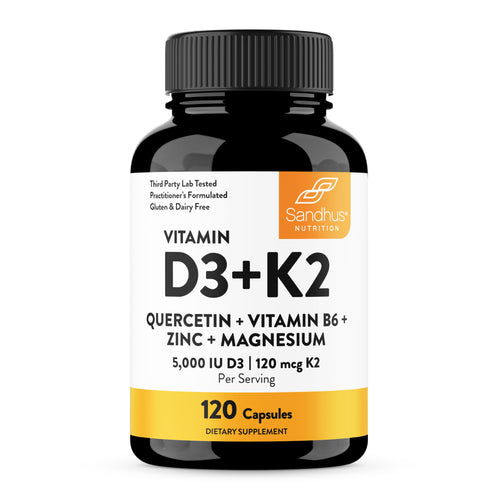Here are 5 Science-Backed Reasons:

1. D3 Supports Healthy Serotonin Pathways
Vitamin D3 helps your body manage the enzymes that make serotonin, the neurotransmitter often called your “feel-good” chemical. Serotonin supports a balanced mood, and emotional well-being.
When your body doesn’t get enough vitamin D, whether from sunlight or diet, it can affect how efficiently serotonin is made and used. That’s why lower vitamin D levels are sometimes linked with changes in mood or energy, especially during darker months.
2. D3 Helps a Healthy Stress Response
Stress is part of life, but how your body handles it depends on balance. Vitamin D3 supports that balance through its connection to the HPA axis (hypothalamic-pituitary-adrenal axis), the body’s built-in stress-management system.
When vitamin D3 levels are healthy, your body can respond to daily stress in a smoother, more controlled way. It supports communication between the brain and adrenal glands, helping regulate how you react and recover from tension.
3. D3 Works with Your Sleep–Wake Rhythm
Your sleep and your mood are deeply connected and vitamin D3 has a quiet role in both. Research suggests that vitamin D receptors are found in areas of the brain that influence the sleep–wake cycle.
When vitamin D3 levels are low, your internal body clock may shift, making it harder to fall asleep or wake up refreshed. Over time, that can influence your daily energy and emotional balance.
By supporting healthy vitamin D3 levels, you help your body maintain a steady circadian rhythm—the natural rhythm that keeps sleep-wake cycle in sync.
4. D3 Supports Cognitive Clarity and Focus
Your brain uses a huge amount of energy every day, and vitamin D3 helps it function smoothly. D3 supports nerve cell communication and helps ease brain cells from everyday oxidative stress—tiny imbalances that can build up from daily life.
When vitamin D3 is in balance, it supports clear thinking, and concentration. It’s one of those small, invisible ways your body helps you stay productive, alert, and mentally sharp through the day.
5. D3 Supports Motivation and Drive
Vitamin D3 plays a role in how your body manages dopamine, a neurotransmitter that influences motivation, and the feeling of accomplishment after completing tasks. Balanced D3 levels can help you stay more focused, uplifted, and engaged through the day. When levels drop, drive and interest can fade. Keeping D3 steady helps your mind stay energized and your mood naturally more positive.
Swapping in fresh, homemade meals with lighter seasoning can help your body hold onto more magnesium.
How to Support Vitamin D3 Levels Naturally

You can’t always control your sun exposure, but you can take simple, daily steps to keep your vitamin D3 levels in a healthy range.
- Include fatty fish (like salmon or sardines), egg yolks, or fortified dairy and cereals.
- A well-formulated vitamin D3 supplement can fill the gap when sunlight or diet rich in vitamin d3 is limited.
- Consider D3 + K2 supplement as K2 supports calcium balance and complements D3 for whole-body benefits.
- Vitamin D3 is fat-soluble, so take it with a meal that includes healthy oils, nuts, or avocado for better absorption.
- Stay consistent, Vitamin D3 works best when taken regularly. Pick a time like breakfast or lunch—and make it part of your routine.
Always check supplement labels for serving size, certifications (like GMP), and third-party testing for purity. If you take medications or have a health condition, talk with your healthcare provider before starting any supplement. Individual results may vary.

Final Takeaway
Vitamin D3 is more than a “sunshine” nutrient, it’s a mind-supporting nutrient that helps your body keep mood, stress, sleep, and focus in balance. Keeping your D3 levels in check is one of the simplest, most natural ways to support emotional well-being and mental clarity. Small steps like eating D3-rich foods or taking a daily supplement can make a big difference over time.
FAQs
1. Can vitamin D3 support mood instantly?
No. Vitamin D3 supports your body’s natural mood pathways over time. It’s best taken daily and paired with a balanced diet and lifestyle.
2. Why do people combine vitamin D3 and K2?
Most people combine vitamin D3 & K2 or they take vitamin D3 + K2 supplement, as these work together—D3 helps your body absorb calcium, and K2 helps guide it into bones where it belongs.
3. Is D3 better than D2?
D3 (cholecalciferol) is the same form your body produces from sunlight and is generally effective for helping maintain vitamin D levels.
References
- Is Vitamin D Important in Anxiety or Depression? What Is the Truth? - Learn More
- Effects of vitamin D on mood and sleep in the healthy population: Interpretations from the serotonergic pathway - Learn More
- Vitamin D: A potent regulator of dopaminergic neuron differentiation and function - Learn More





